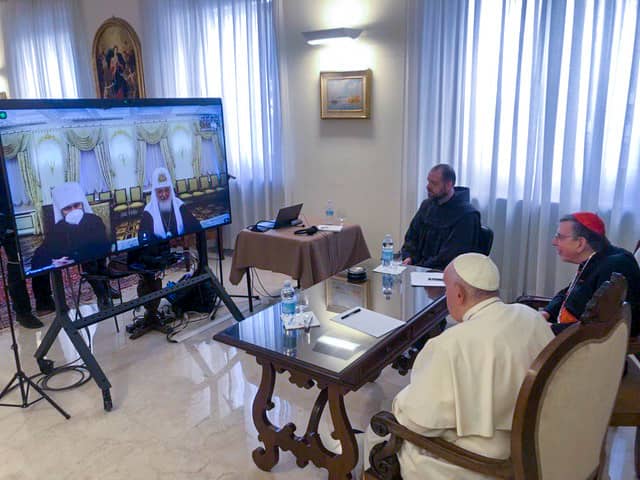ROME – When we look back at the Catholic experience of the coronavirus, it will be tempting for closures and suspensions to be what we remember most. In many parts of the world Catholics were unable to attend Mass for months, driving some of them online for worship and others into a sort of spiritual suspended animation.
It would require a deeply impoverished view of the Church, however, to conclude that Catholicism itself was somehow suspended. The truth is that no one ever hit the “off” switch on Catholic activity in terms of the Church’s sprawling galaxy of charities, movements, religious orders, lay organizations, and other forms of life.
Here are three quick examples, drawn more or less at random from an almost countless range of possibilities.
First up is the movement Servizio Missionario Giovani, “Youth Missionary Service,” better known by its Italian acronym “Sermig.” Founded in Turin in 1964 by an Italian activist and writer named Ernesto Olivero, its founding idea was to form youth who would work to eliminate the great injustices of the world and to foster peace.
During the upheavals of 1968, when many idealistic young Catholics were drawn to leftist politics, members of Sermig presented themselves as “simple Christians” without any ideological affiliation. That choice allowed them to survive the culture wars more or less intact, focusing on combatting poverty in the developing world. Over the decades they’ve carried out thousands of projects in more than 100 countries.
In 1983, city officials in Turin agreed to turn over a former military arsenal to the community, which they renamed the “Arsenal of Peace.” It became a main social center and shelter for the city’s poor and homeless.
During the coronavirus lockdown, Sermig made the decision never the close the center, housing more than 200 people during the worst of Italy’s pandemic.
“We decided, with difficulty but with hope, to leave the door open, because if we closed, where would these people go?” Olivero said. “This is God’s house, this is Mary’s house.”
“We wanted these people to have a shelter in a specific house, a place of hope,” he said. “We’ve seen that so many people here in Turin are poor and have nothing to eat,” noting that the Arsenal of Peace has been distributing meals to roughly 500-66 families during the pandemic and also distributing medicines to those who need it.
Next is the ever-kinetic Community of Sant’Egidio, which, one often has the impression, has never taken a day off since it was founded by Italian layman Andrew Riccardi in 1968.
A particular favorite of Pope Francis – shortly after his election, he exclaimed from the window of the papal apartment overlooking St. Peter’s Square, “They’re great, these people from Sant’Egidio!” – the community is known for its work on conflict resolution, ecumenism and inter-faith dialogue, migrants and refugees, and poverty relief.
This week, the community announced that its annual “Sant’Egidio Summer” campaign will be in full swing this year, though with respect for all the precautions associated with the coronavirus – social distancing, the use of masks and gloves, avoiding large public gatherings, and so on.
In virtually all Italian cities during July and August, Sant’Egidio will continue to offer regular meals for the homeless, keeping their soup kitchens and social assistance centers open for whoever may need them. They’re also planning trips for the poor to the lake, the sea and the mountains – one of the glories of Italy is that all three are never that far away – as well as visits to parks and museums.
“It’s a time of friendship and solidarity, because physical distancing should never become isolation and solitude,” a statement said. “It’s a vacation made possible by the free and unpaid commitment of numerous volunteers.”
Alongside the “Sant’Egidio Summer,” the community is also running its “Summer School of Peace” again this year, serving students from primary and secondary schools in Rome’s impoverished peripheries. They’re also running a special program for 150 youth from the Rom community – sometimes derogatorily referred to as “gypsies” – offering educational opportunities and support for their schooling.
Then there’s the “Federation of International Christian Organizations of Voluntary Service,” which, understandably, most people prefer to call by its much shorter Italian acronym, “Focsiv.”
Inspired in part by St. Paul VI’s 1967 social encyclical Populorum Progressio, it’s an umbrella group that brings together some 86 non-governmental organizations, most of Catholic origins, which are active in the global South promoting development and poverty relief.
In partnership with the Catholic charitable federation Caritas, Focsiv recently launched a new campaign called “Give Us This Day Our Daily Bread,” intended to raise awareness about the human toll of the coronavirus and to generate funds for concrete initiatives, especially focused on education and work.
The first focus of the campaign is on hunger, facing UN estimates that the number of people in the world at risk of not having enough to eat could almost double between now and December, from 135 million to 250 million.
The formal launch of the project is today, July 8, which is both the first “International Day of the Mediterranean Sea,” a new observance promoted by a cluster of Italian groups, and the seventh anniversary of Pope Francis’s 2013 visit to the Italian island of Lampedusa, the debut of his signature concern for migrants and refugees.
I’ve drawn these three examples from Italy, because it’s where we live, but similar stories could be told all over the world.
Yes, what Catholicism didn’t – more accurately, couldn’t – do for much of the coronavirus quarantine is an important part of the story. But those missing pieces should never outweigh, or obscure, the myriad things Catholicism in its broadest sense did do and always will do.
Follow John Allen on Twitter at @JohnLAllenJr.















